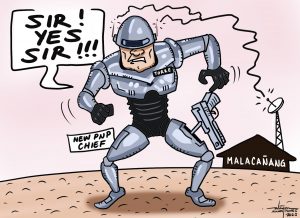(Speech delivered at the webinar on Transitional Justice on September 21, 2020, organized by the Ateneo de Manila University’s Martial Law Museum, Commission on Human Rights and the Transitional Justice League).
One day in March 1983, I was going to pass on documents of human rights violations to a German Lutheran Pastor who was leaving within the week back to Germany, and through him the documents would find its way to the Human Rights groups. This was the period when we had no social media, and one could not trust the post office, so the only way we could send reports abroad was through friends who came for exposure trips. Unknown to me, the German pastor was tailed by the military to the apartment where he stayed, and there along with those living there, were all arrested, tortured and kept in isolation. One of the women in the group was gang-raped.
Caught with the documents, the military could now charge me with possession of subversive materials and subversion. They also raided our office and planted arms, so I could be charged with possession of weapons. I was airlifted immediately to Manila where I faced the notorious General Galileo Kintanar and kept incommunicado for a week at Camp Bago Bantay. As they could not pin me down, and with the late Sen. Jose Diokno and Sr. Marianni Dimaranan filing a habeas corpus case with the Supreme Court, the military had no choice but surface me. But I was still incarcerated for 22 months until the courts cleared me and Marcos had no choice but sign my release papers, just before EDSA took place.
So just how many of us got victimized by the Marcos martial rule? Data from TFD and human rights monitoring groups estimated that 3,257 were victims of extrajudicial killings, 35,000 cases of tortures, 77 disappeared and 70,000 got incarcerated. Of the 3,257 murder victims, an estimated 2,520 were tortured and mutilated before their bodies were dumped in various places
Naturally when the Marcos regime collapsed and in the aftermath of the EDSA revolution, many of us were desperately hoping that a transitional justice system would take into effect, given the popularity of Mrs. Cory Aquino, whose own family also got victimized. Emerging from the period of conflict and repression, there were high hopes that the massive and systematic human rights abuses committed by the Marcoses – from the dictator and his cronies and top military generals down to the lowest-ranking CHDF – could be made accountable for their abuses and the victims provided redress.
Unfortunately, despite some initial attempts of the Aquino administration, a transitional justice system never got off the ground. Thanks to the efforts of Atty. Robert Swift and the likes of Etta Rosales, there was compensation to human rights victims, but not all victims got their share. Later during Congress also made a delayed response and also passed a law providing compensation and this time more were able to benefit, but by the time the funds were released some could not be located or have died already. Through the years, the post-EDSA governments never managed to pin down the abusers and make sure they spend time in prison. And recently the Marcoses have won many of the litigations that were filed in court to recover the wealth they stole from the country’s coffers.
And to our horror, on 23 May 2017, we in Mindanao were subjected again to another declaration of martial rule which lasted for almost three years, being lifted only by 31 December, 2019. Before President Duterte formally signed the martial law papers, there were talks already that martial rule was going to be imposed not just in Mindanao but the whole country. Our reaction naturally was – Oh no, not again! The Dutertards were quick in justifying this martial rule because of the dangers of terrorism as well as claiming it will not repeat the Marcos record of massive human rights violations. But given the number of EJKs (extrajudicial killings) that took place owing to Duterte’s drug war – which is much higher than the statistics of victims under the Marcos regime – and the fact that until today no one really knows how many people died during the Marawi siege, as well as the assassinations of Lumad leaders, peasant leaders and human rights advocates, one cannot just claim that Duterte’s martial law is OK.
But why has my generation experienced martial law twice in our lifetime? Because we as a people have not really learned the lessons of history and we have failed to make sure that those in power can be accountable to make sure transitional justice takes place every time we are faced with a crisis that threatens our democratic processes, and God-given human rights.
[MindaViews is the opinion section of MindaNews. Redemptorist Brother Karl Gaspar is a professor at St. Alphonsus Theological and Mission Institute (SATMI) in Davao City and until recently, a professor of Anthropology at the Ateneo de Davao University. Gaspar is author of several books and a Datu Bago 2018 awardee, the highest honor the Davao City government bestows on its constituents]

